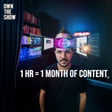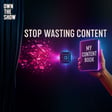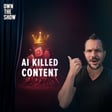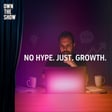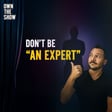Become a Creator today!Start creating today - Share your story with the world!
Start for free
00:00:00
00:00:01

Your Unfair Advantage AI Can't Fake
Should you start a podcast? Take the free assessment: https://AIdrivenmarketer.com/pod
In this AI marketing podcast episode, Dan Sanchez and Ken Freire break down how your personal core values are your greatest unfair advantage in the age of AI. While AI can mimic tone, produce content, and automate tasks, it can never replicate your deep convictions, beliefs, or lived experiences. They walk through a step-by-step roadmap for identifying and clarifying your core values and how to turn them into magnetic forces in your marketing, leadership, and business.
My Favorite AI Tools
- Tella (AI screen recording app I record all my solo episodes with) - https://danchez.com/tella
- High Level (My all-in-one marketing platform) - https://danchez.com/highlevel
- Zencastr (Best AI podcast tool) - https://danchez.com/podtools
- n8n (my favorite AI automation tool) - https://danchez.com/n8n
Resources Mentioned
- Core Values Word Bank:
- AI-driven Podcast Fit Assessment - https://AIdrivenmarketer.com/pod
Timestamps
- 00:01 – The human edge over AI: core values and lived experience
- 01:19 – What your "why" really is and why most people lose sight of it
- 02:32 – Why core values are your differentiator in a sea of AI sameness
- 05:20 – Ken's journey: discovering and teaching core values
- 06:53 – What core values are (and aren't)
- 10:19 – Ken’s 5-part framework: Believe, Become, Build, Belong, Bless
- 15:05 – Using life stories and reflection to uncover values
- 19:14 – The "Reality Audit": time, money, energy, and fear as value indicators
- 23:14 – How to shortcut the process using ChatGPT
- 26:19 – Final step: aligning and refining your true top 5 core values
- 30:32 – Core values in marketing: bring them to life with stories
- 35:29 – 3 key stories every marketer should craft to express values
- 38:14 – Add the story of transformation to the mix
- 39:36 – Stories across your content make your values unmistakable
- 40:46 – Getting help: AI can assist, but humans help discern your truth
Transcript
00:00:01
Speaker
know You have an unfair advantage over AI. And the longer you've been alive, the more work experience you have, the more expertise you've honed, the better this advantage is going to be.
00:00:15
Speaker
Now, before I dive into it, I got to say that Simon Sinek had it right when he said, people don't buy what you do, they buy why you do it. The problem with that phrase is your why often gets lost in a sea of different motivations you have for doing what you do because people don't buy your why because you want to earn more money.
00:00:36
Speaker
But there are other whys hidden within you that can set you apart from AI, your competition that nobody else will ever be able to copy. And it's around your core values.
00:00:49
Speaker
In this episode, we want to give you a map to clarify what you believe, why you believe it, and how to communicate it in such a way that it repels the wrong clients that aren't going to work well with you and attracts the right clients that are going to be the best fit for you and your business.
00:01:05
Speaker
So, Welcome back to the AI Driven Marketer. I'm Dan Sanchez. I'm joined by my co-host, Ken Ferre. Yo, yo, yo. What's up, bro? And we're continuing on in the series of pod to book around the topic of own the show, which is our guide for how to become an authority in the topic of your expertise in the age of a i But today we want to unpack those core values because while this kind of seems like a kind of a mushy area It's something that is your unfair advantage when everybody is going to be sounding good. Everybody's going to be sounding like they have something awesome to say.
00:01:42
Speaker
Yesterday, we talked about authenticity and the importance of showing up in unique way based on those values. But today, we're giving the practical roadmap. Now, Ken, you've been talking about core values and helping people discover their values for years now. like This has been a thing for you for a while.
00:01:58
Speaker
don't want to kick it off. Like, How did this become a thing for you? Tell me the story of how this became an important part of what you do. Yeah. So I was about 19 years old and man, I just had no idea what to do with my life. I was going to college and I was like, is this the degree I want to do And I just wrestled a lot. Like,
00:02:19
Speaker
what am I designed to do? What am I called to do? you know and and and I tried a lot of different things and I just couldn't figure it out. and i And part of it was I had this false belief that I was only called to do one thing for the rest of my life.
00:02:34
Speaker
And I was just stuck at And if I don't find that one thing that brings me joy and peace and satisfaction right away, I'd be done for. So I had to stop and say, like well, what if I was actually designed a certain way? and I believe this for all of us, that we have these innate values within us that when we walk out those values, man, there's so many different things we could do to to find fulfillment and actually live a God-given, purpose-driven life.
00:03:01
Speaker
And when I started doing that, man, all of a sudden I felt the freedom to actually go live life. And the shackles that I felt constrained on of like, well, what if I do this? Or what if I don't do this?
00:03:12
Speaker
Just kind of went away. And I felt a lot more freedom to just kind of say, oh, I'm going to go try that because it's the way I'm wired or it's the way that I perceive life to to go.
00:03:23
Speaker
I'm going to do that. kind of say as like a filter, right? Yeah. There's so many paths you can take, but when you're clear on your values, it, it really eliminates a lot of options.
00:03:35
Speaker
Right. And I think we all have like, what is it called? Decision paralysis, right? Like there's just so many choices you need to make little choices, medium choices, big life choices, and your values really bring a lot of clarity. So it's kind of a helpful thing for life. And it was a helpful thing to you,
00:03:50
Speaker
ah So how when did it become, when did you start teaching it as a thing to help other people find it? Yeah. So probably in my early twenties, I would say around 23 or 25, I can't remember the exact day. I just remember there was people like we both were at working at a nonprofit doing leadership development.
00:04:08
Speaker
And there were people who just came into the program who started having the same similar questions that I did. And I was like, I remember struggling with that. So I just started teaching them like, Hey, this is what I did. And then I started to formulize it. I started to read on it. And then when I started to do my master's degree, it became a lot more clear that, man, I just love helping people figure out what they're called to do.
00:04:29
Speaker
And i started coming up with a lot of different frameworks. This one i was one that I actually learned at my church and I've modified ever since. They were kind of the the first seed of it. And then I was like, well, how do we expand this for people in all different seasons of life?
00:04:45
Speaker
not just college age students, but people out of the workforce or people who are getting ready to retire? how does How can this still apply to everyone? So what is the process you've been walking for? I know you've refined it over time and now you have like a clear step-by-step process that you've been using for years now and have made modifications to. How do you walk people through? Because it's it's one of those things, it's like, it's hard to sit down and be like, huh, what do I value?
00:05:11
Speaker
Well, I value... love? How do you not value love? How do you not value you? Like you look at a bunch of things, you're kind of like, yeah, but which ones are the most important? It can be a draining kind of exercise, but then how do you make it easy for people to figure out like, what are the things that actually matter the most to me?
00:05:28
Speaker
Yeah. Well, I think first of all, most people don't actually stop and and never think about it because one, their the life is too busy and two, it can feel really overwhelming. But if you take enough time to pause and say, hey, there's there's a way, a framework to understand stuff, it becomes a lot easier is the way I like to think about it, not like super easy.
00:05:49
Speaker
But first, i want I want to talk about why core values matter, right? Because I think we hit on it, but it's really important in this discussion. And it's going to help you figure out what those core values are if you understand what why they matter.
00:06:01
Speaker
Number one, I think it's because it helps you make decisions really clearly. Right. Like if you don't know what you believe in, why you believe it it, it's really hard. Right.
00:06:12
Speaker
And then the other one is that core values ultimately guide you, I believe, to love others better. If you're not loving other people better, man, your core values are out of whack and you need there's something that needs to change.
00:06:26
Speaker
So those two things really helped me. ah to understand that. So let me be a little bit, let me do a deep dive on what core values are and what core values are not, because that's going to also the definition of that is going to help. help So what core values are, I think that they are convictions, first and foremost.
00:06:45
Speaker
This isn't just a preference. This is like true convictions that you're like, if everything hits the fan, I'm still going to believe this, right? It's your guiding star. The second one that you're actually living them out. They're not theoretical.
00:06:59
Speaker
Meaning like I get a great great example. A lot of times people are like, oh, I value health. But when you look at what they eat and how they live their life, I'm like, I don't know if health is the one that they value. So it's got to be a lived out thing.
00:07:11
Speaker
And the the other one is that I actually think core values are revealed over time. As you discover more of who you are and how you're designed, that's going to help. And then what they are not.
00:07:24
Speaker
is really important too. I like to look at the positives of negatives. the The negatives is that they're not personality traits, okay? Core values are not personality, like, oh, I'm outgoing, so that defines who I am. Like, no, that's not it.
00:07:36
Speaker
And they're also not aspirational fantasies. Like, hey, I one day wanna be a Navy SEAL, right? Like, um you may have a Navy SEAL mindset, but it's not a fantasy, right? And it's also not circumstantial, meaning that, oh, well just because I'm in this situation today, this is how I make this decision.
00:07:55
Speaker
Man, we all do that in life, but that's not a core value. It has to be something that sticks no matter what. So as you look through those And even as i I reflect on what you're saying, a core value is why it's important.
00:08:09
Speaker
Gosh, it reminds me of people that I know that have strong core values. And again, it's one of those things where people's values either repel you or attract you. And I think one of the people that attracted me the most was James Carberry, partly because we share a lot of same core values, but you make man, that guy bleeds core values, yeah which is why I still talk about him. Like I can't go like a few months without talking about James Carberry and Sweetfish.
00:08:32
Speaker
who is a a past employer of mine. If you, if you haven't been listening to the show long and I always recommend James, if you need a help with the podcast because he values people. And I've heard his stories about how he goes to the nth degree to value people and show kindness and love and respect and in a hopeful and helpful and optimistic way that I just, it it just draws me to him. And I love that about him.
00:08:57
Speaker
And i continue working with him, referring him because of that kind of stuff. And I'm like, that's why this stuff is important. not just because it's helpful for you, but because it's going to be the critical ingredient, even in your marketing, that will make you a lot different from everybody else.
00:09:15
Speaker
Yeah, absolutely. So I guess the big question becomes, all right, you guys are are talking about the definitions, but like, how do we actually figure out the core values? Yeah. Right. So here's the framework I've used.
00:09:27
Speaker
Number one, I always want to figure out what is it that you truly believe? What belief system are you walking with? with Now, Dan, you and I are both Christians, so a lot of our belief structure comes from that.
00:09:39
Speaker
But there are other people who are going to have different belief systems or different worldviews. And as long as you understand that for yourself, that your worldview is going to drive a lot of your core values,
00:09:50
Speaker
right? You need to start asking like, well, what are those core beliefs of whatever system you're believing? That does take a little bit of work. Now, one of the things that I have done is, and and again, I wasn't the one who invented this. i Someone first introduced it to me and then I modified it ever since is I created a word bank of like 60 words, right? And and all of these 60 words are just supposed to be words that might resonate with you. When you see it, you're like, yes, that's what I believe, right?
00:10:19
Speaker
Now, We have, I have typically five different areas that I look at. So the first one is belief. The second one is becoming like, who are you becoming as a character? Like, what do you really want in life and also are living out.
00:10:36
Speaker
For example, there are some people who are really huge into being disciplined, right? They're like, I'm waking up at 4.27 AM. I'm looking at you, Dan, right? and And their their core value is they have a disciplined lifestyle. I'm like, I'll wake up at 5.58 in the morning. You know what? Like how the latest I can go. I'm not, I would say I'm somewhat disciplined, but not the most disciplined person.
00:10:59
Speaker
ah But then, so, so far we got believe, then you got to become, Then the third column is build. So what is it that you naturally are excited to build constantly? um I think there are themes in there.
00:11:10
Speaker
The fourth one is belonging. So how are you loving and strengthening other people? And then the other one is blessing people. Like how are you being a good steward of the resources in your life?
00:11:22
Speaker
Now, those are the five categories that i typically look at on how do you find core values? So believe, become, build, belong, and bless. Now, each one of these has so many different words in it. Again, 60 different words.
00:11:34
Speaker
And these words are are called to help resonate with you. Like, oh, this is what I believe in. Now, if you want this, you could just probably reach out to us and I could just send you send you the document, the working document that I have. We'll put a link in our show show description.
00:11:48
Speaker
Perfect. You guys can copy it. You guys can paste it. You guys could just start looking at it and seeing, yes, this is, you know, it could be helpful. So that's the first thing that I typically want to do with people is not start with a blank slate.
00:12:00
Speaker
I want them to start with like, hey, here's some words that might be able to start priming the pump. I'd like to say. Yeah. So you use the words to kind of, I don't know, look at them and then you could start to make decisions about what aren't your core values. Right. Because even as I'm looking at the list that's in front of me now, there's a few of them that I'm like, and while that's a good thing, it's hard to say no to core values, by the way.
00:12:24
Speaker
You're like, well, I don't know if empathy is my top one, even though I value empathy. Empathy is a great thing. I just know it's not the thing that I lean on hard.
00:12:35
Speaker
Yeah. Yeah. and it almost It almost sounds like a sin to say that, say that, but it's it's just going to be true. You have to let go some that, you know, aren't your core values because you lean but more, more into discipline or something like that.
00:12:49
Speaker
So this is a good start. Maybe we find a few of these and we're like, yep, these, these, these are the ones. How many do you recommend that we hone in on? Well, if, if I was actually like doing a workshop with people and walking them through it, I typically start with like, Hey, pick,
00:13:04
Speaker
In each column, pick three to five in each column, just to start with. Okay. Yep. There's five columns. yeah Yeah. There's five columns. So you'll walk away with 15, right? Or 25 at the beginning.
00:13:15
Speaker
You're going to whittle that down to five. It's really hard to try to get to five, but like we try to say do five. I know some people are going try to push 10. The reason i say five is because there are going to be times in your life when you're, you're faced with really hard decisions.
00:13:33
Speaker
And you you realize that if you really process what's going on in your heart and mind, you're actually wrestling and competing with one of your core values.
00:13:44
Speaker
And if you're not like cognizant of that, it's like, oh, okay, that's why you keep wrestling and you have decision fatigue. So that's why I'm always like, what are you the top five that you're constantly wrestling through?
00:13:55
Speaker
And that's going to be more helpful than trying to say 10 because decision fatigue will come back faster if you do that. Okay. So the word bank section was step one. What's step two?
00:14:07
Speaker
Yeah. ah The second step is kind of a what I like to call story reflection. So this is where you start to actually, these are open-ended questions where we're trying to reveal or uncover what are the things in your own life that show that these values are actually showing up.
00:14:24
Speaker
Okay. So for example, i might ask you a question like, tell a story of a time you acted courageously or took a step of faith. i I just want to see what happened, which value showed up.
00:14:36
Speaker
And again, what we're trying to do is is now that we have these word banks, this word bank, and you've circled a couple of them and you're like, yeah, these are the 25. Are they actually showing up in your life?
00:14:48
Speaker
So we're kind of taking a historical point in time. Another question might be, tell me of a start ah time you prioritized a person or mission, even when it costs you something.
00:15:00
Speaker
So again, values, you are willing to sacrifice certain things, right? and And I'm not talking about like you're sacrificing your family. I'm talking about sacrificing smaller things. You're like, yeah, I'm willing to sacrifice some sleep because I value this thing or whatever ah that thing is, right?
00:15:18
Speaker
Or another question that i'd like to talk about is tell me a time when you felt fully alive when you were doing something where you were just like, man, this really matters. I'm willing to to do this and you're excited to do it.
00:15:30
Speaker
These questions are there to help you reveal what are the things that you're really passionate about. I'll give you a great example. My wife and Dan's known my wife longer than I have known my wife actually.
00:15:44
Speaker
ah But like one of her core core values is like adventure. She loves adventure, right? So when you look at our lives and the lives and the way we set up our family structure, there's always some sort of activity, some sort of adventurous thing that we're trying to do with our kids because that's just naturally who my wife is.
00:16:00
Speaker
So like if I ask her, hey, what's the last fun thing we do with our kids? Boom, she could tell you right away. and And that's just natural for her. So it's it's those things that you kind of want to find. you don't When you're asking these questions, it doesn't want to be something you're like pondering that the existence of and meaning of life. It should be something that comes right off the top of your mind. You're like, oh, I love this, or I love doing this, or this is what I'm passionate about.
00:16:25
Speaker
remember I did this a number of years ago and the three core values that have come to me over and over again and in different phrases in different ways. But then I boiled it down to three. I finally got it down to three because I couldn't.
00:16:36
Speaker
Five was just too many for me. It was hard for me to remember. And then I simplified it and turned it into a little acronym, of course, because that's what marketers do. um but it was helpful, humble, and optimistic.
00:16:49
Speaker
And those have been guiding principles, not just for me in my life, but also for the way I behave online, the the way my content comes across. I have to pull myself back in the comments on LinkedIn from going, going, throwing a haymaker in the comments, because i'm like, Dan, be humble.
00:17:04
Speaker
You value, hump ask a question, don't throw the haymaker.
00:17:09
Speaker
But it all summarizes up the humble, helpful, optimistic is H2O. So I'm like, be like water. You would do that. I didn't know that. Yeah.
00:17:20
Speaker
You know, and it's funny because I'm like, I'm all about, we were talking about this yesterday. I'm all about being a person of truth. I am like, in some ways, I'm very black and white. And Dan's like, ah there's some gray there, right?
00:17:31
Speaker
Yeah. But I also value grace, like being very gracious to people. So there are some times I just want to go like full tilt and just like blast someone. And I'm like, is that being gracious right now? yeah And it's not. So then I have to hold myself back.
00:17:44
Speaker
Those are two core values that I hold. And sometimes they're intention, right? Like which one do, and how do I be gracious, you know, truthful and gracious at the same time? It's really hard. Sometimes I do a good job. Sometimes i don't.
00:17:57
Speaker
could see a lot of overlap there, but you, that's not the end of your process. There's, there's a third step. So how do people walk through the third step of using all these things to clarify what their beliefs are, what their values actually are?
00:18:12
Speaker
Yeah. Then I like to take what's called a reality audit. And in this, what we're trying to look at is where's your time, your money, your energy, And even your fears, where are they going?
00:18:25
Speaker
right Because I think all four of those things reveal what you truly value. ah So for example, if you if I were to sit down with you, I want you to take the next 90 days or or whatever and say, hey, what did you do with your time?
00:18:38
Speaker
What are you consistently protecting or what always made it on the calendar? right So again, I'm just going to go back to if you're saying, hey, I value health. And all of a sudden, I look at your calendar for 90 days and you're like, well, you've never worked out once.
00:18:52
Speaker
Like, listen this is where the truth value of mine comes in, right? I want to kind of come in hard. I'm like, do you really value that? Now, a gracious side would be like, well, hey, how could we add that and prioritize that, right? Like, there's a diplomatic way of saying it.
00:19:05
Speaker
Money. Where's your money going, right? There's a lot of things that you say you value. Where does this go? and And I think this one's really important because there's a lot of virtual signaling a lot on social media, right? And they think, oh, well because I posted about this need or the situation, I'm doing the job. I'm like, well, put your money where your mouth is.
00:19:26
Speaker
Do you really care about that? Where is your money actually going? Or are you just going to go to Starbucks and get another venti, latte, caramel, frap, whatever nonsense, right? And then the other one is the energy. Like, where are you putting your your your energy? What are you sacrificing? What are you pushing towards?
00:19:43
Speaker
And then the one that I want to hit on real quickly is your fears. I think a lot of times we avoid the things that we truly, truly care about because we're afraid of what we might lose.
00:19:54
Speaker
ah So another way to ask is like, what values are you trying to protect? um So good a good example for me is I value security and family. So sometimes, right, wanna do certain things. I'm like, I wanna be risk taker and I'm like, let's go start this new business.
00:20:13
Speaker
But security is like, hold on, you need you need something stable for your family. You don't want your family to suffer. So I sometimes have to like push through that fear that I'm not going to have enough for my family and say, well, no, no, we're called to be risk takers.
00:20:29
Speaker
As men, that's what we're designed to do, right? Like just kind of keep pushing and keep a building. So I'm like, all right, I'm going to try something new. It might work, it might not. But those are the kind of, I want people to look at their life and do an audit. Because if you don't do an audit, you won't be able to see where ah you might be falling or what or what core value is actually there.
00:20:51
Speaker
So we need to be able to establish our base beliefs, you know, like worldview, your, your base system that you, you ascribe to, and like, uh, it could be a religion. It could be a philosophy, ah whatever that is, there's usually a base thing that's driving a lot of your decision-making.
00:21:09
Speaker
At the very core value of who you are, what you do, your beliefs about what's wrong with the world and where the world should go. um So there's that. Then there's taking inventory of a lot of different values that most people would say are things to value, right?
00:21:24
Speaker
Based on that worldview. Whittling those down to a few select words, five at the, at the, at the most, it could be less. um And then you actually reflect on them and say like, when has this been valuable? Ask yourself hard questions about them. And then you're taking an audit of your, your time.
00:21:43
Speaker
And saying, when did it show up in the last 90 days is like a final filter, a final test. So maybe they go from five down to four because they find that one even though it's aspirational, isn't actually value, at least not currently.
00:21:59
Speaker
They could become one in the future. So how do they how do they wrap this whole thing up? Yeah. Well, before we we wrap it up, Dan, there is one thing that we could do is how do you use AI to find the core values? And you had a great insight before we we we got, we're talking about AI, right? We're like, oh, how do you use AI?
00:22:18
Speaker
You had a great insight before we we started recording. Yes. This, this can be exhausting work. If you've ever been to a workshop on even how to discover your core values, man, it can be like, even this section of a half day, went through one, you were working with Michael Hyatt and he has a whole thing on this, but it can be tiring to think through it and think about the stories and do the audit.
00:22:40
Speaker
but But there is a cheap hack we can use. But you have to have been using ChatGPT for a while. But believe it or not, if you've had the, this if you've been having lots of conversations with ChatGPT for a period of time, maybe a year or more, it knows a lot about you and the questions you ask and the things you do. If you're brainstorming with it a lot and even sharing some life things with it, then it knows a lot.
00:23:03
Speaker
If you have the the feature turned on where I can remember past conversations, you can ask AI to say, hey, based on our previous conversations, what would you say my top three to five values are?
00:23:17
Speaker
Now, It is very insightful. It will probably guess accurately. It will probably might not be the the full list because it might but you might not talk to and about everything with ChatGPT, but it'll give you a pretty good running start.
00:23:31
Speaker
And then you can walk through the reflection and the audit with it to double check to see if it's actually showing up in your life. But it's a kind of a way to go through that word bank and kind of cut through... you know, 80 to a hundred values really quick to find a surface some really fast because chat GPT is pretty good at calling out those things in your life.
00:23:50
Speaker
Yeah. The other thing that I've done with AI recently is I would take some of these questions and like even the the worksheet that I typically take with people and I'll be like, Hey, ask me all these questions one at a time as if you were my coach.
00:24:05
Speaker
And that's super helpful to just verbally process with it. And it can take all of that information and and spit out like, oh, these are probably your core values. Yep, that is a great one.
00:24:16
Speaker
So the prompt would probably be, hey, I'm trying to discover my core values chat GPT. Ask me five to 10 questions that once answered would reveal to you what my core values are.
00:24:31
Speaker
Yeah, this, I mean, that process would take some time because answering questions like that aren't easy. It's usually like, what, when was a time you've experienced adversity and what did you decide? How did you act on it? You know, it's like, it's, you're like, when, when was, what when was that?
00:24:44
Speaker
Yeah. But that'll be probably great way to reveal what some of those values are. They're probably, I'm guessing 20, 30 minute activity to answer those questions. so Yeah. And that's for someone who can think on their feet.
00:24:56
Speaker
What I have found a lot of times you ask those hard questions, they're like, I don't know. And they stop. That's why I think the word bank is really important because it just primes the pump a little bit where they're like, oh, I do.
00:25:07
Speaker
This resonates with me more than the other ones. It doesn't have to be the end all be all, but it just resonates a little bit more. So let's wrap it up. As we start talking about all this stuff, the last thing that you want to do is fine refine them and have alignment.
00:25:21
Speaker
right So if you are doing the word bank, then you have reflection, then you're doing an audit. What you want to do is you'll notice in some of those things that there might be some other core values that show up, right? That you're like, oh i I forgot about that one. Or there's going to be overlap. The more overlap, the better, right?
00:25:38
Speaker
But what you need to do now is start start to say, for the ones that don't overlap, where do they actually rank, right? So a couple questions that i like to ask is which one of these feel core to how I believe God designed me? Right. Or which one one which ones show up in multiple seasons of my life?
00:26:00
Speaker
Or again, the ah two more questions that i like to ask is like, which ones reflect conviction, not convenience? Like it's truly like I'm willing to do this. And the last one, this is kind of like the haymaker question I like to ask, but it's like, if I had to lose all of these core values, but one, which one would I fight to keep?
00:26:20
Speaker
It it like forces you to actually ask the question like, yes, this is what I want. Once you do that, man, I say, hey, take all of that information and boil it down to five core five core core values and have a phrase for each core value and what you think that means to you. Because again, I could say discipline.
00:26:38
Speaker
Discipline may mean something to me, what it may mean to you. And I'm not trying to say be subjective on the word, right? Like everything is whatever you mean, but you're having your own spin to it of what it is, right?
00:26:50
Speaker
Like health, for example, some people may say healthy means I'm eating healthy food. And another one's like, no, I'm going to the gym six times a week, right? I'm just trying to make sure that you have a good descriptor that motivates you.
00:27:03
Speaker
Man, even you asking that question, like which one would you fight to keep? i'm like, oh, dang, of my three core values, there's one. Yeah. And it's optimism, essentially hope, hope drives everything else for me.
00:27:16
Speaker
And it's the reason it's, I don't know it's the, it's the motivating, it's the motivating value that I have that fuels everything else. Yeah. Like I have hope. And as soon as my hope's gone, like I, I die inside, right? You're like, uh, interesting.
00:27:34
Speaker
So a lot of these core values, even if you get it right, can sometimes feel like corporate nonsense, right? Because we've all been through those exercises at work or the work is handed out core values on your onboarding day and then you see it posted on the wall and it doesn't really affect any of the company.
00:27:52
Speaker
And that's so normal. That's so common in companies that I think we've all become a bit, I don't know, numb to this whole core value thing. or sometimes like it's like repulsive. You're like, like it's it's people pretending one thing and then doing something completely different.
00:28:09
Speaker
And these probably aren't like that for you because you're acting out of them. It is, they are things that are driving your life, but how does it actually work its way into your marketing to actually help you gain your unfair advantage?
00:28:22
Speaker
In the next section, we want to actually show you a few different ways you can do that. But before I do, before we get into how to actually make the most of them, I have to ask you, have you ever thought about starting a podcast? Yes.
00:28:34
Speaker
Quick ad break. We're going to be talking a lot about podcasts in this series and of course in this this conversion over to a book. um But a lot of people ask, they're not sure if a podcast is right for them.
00:28:46
Speaker
So we created a whole assessment that you can take. It's actually just five simple questions. And if you answer these five questions, you will have a pretty accurate picture of whether a podcast should or shouldn't be in your future.
00:28:59
Speaker
It is not a tool for everybody. It is not a tool that is a one size fits all and should be worked on. But if you're someone who sells with their expertise, you should probably take a look at it. And you can discover if a podcast is right for you at AI driven marketer.com slash pod.
00:29:14
Speaker
So AI driven marketer.com slash pod and find out if it is the right tool for you. If it is, we will hook you up with more resources on how you can have an AI driven podcast, uh, just free to you.
00:29:27
Speaker
So moving on, core values should not be left in a Google drive somewhere, or as a sticky note to remind you of who you are. You're already operating out of these things, but we need to bring them to the surface for a reason.
00:29:41
Speaker
And I find that the best way to bring your core values ah just out of the closet is through the use of stories. Now, Ken, I got to confess to you, man, I'm a marketer and all my other marketing friends are going to judge me.
00:29:56
Speaker
But until recently, like maybe a year, year and a half ago, i was the marketer who was like, man, i don't, I don't get the marketers who like value stories. i was like, That's, that's so fluffy nonsense.
00:30:09
Speaker
Just give me a hard value proposition. Just let me sell it to him with the benefits and the features. And just, I'm just going to split test this. And I'm just going to, like, I'm going to figure out why I'm going to sell this thing.
00:30:21
Speaker
And Ken, I've learned, it's taken me a long time to understand why stories are really important. I just thought it was like fluffy nonsense. Yeah. And what I learned is that the stories are the shortcut. The short stories can carry the value proposition in a way that just a strong statement never could, even if it's perfectly worded to communicate the value that people are dying to learn about.
00:30:44
Speaker
There's something about stories that are like the hack, the shortcut. It's almost like handle for a a a suitcase full of what they really need in their lives.
00:30:56
Speaker
Without that, they have to pick it up and carry every carry to suitcases hard without the handle. It's like the handle that makes it easy. And that's that's my confession in the show today is that I only that that only occurred to me recently how powerful stories were.
00:31:10
Speaker
But I find that also it's, it's the way that people communicate values. Has there ever been a story you heard from somebody else where you're like, oh, like that tells me everything I need to know.
00:31:23
Speaker
Yeah. I mean, that there are times where I think about stories and how much I'll give you a good example. Like, you know, during reels or something like that, how much something can tug in my heart.
00:31:36
Speaker
I had a friend of mine who posted something yesterday who he talked about taking his family, like his son, on a vacation. And everybody's giving him a hard time. He's like, why are you taking your two-year-old on vacations? He's not going to remember all that stuff.
00:31:52
Speaker
But then he said, you know what? He might not remember it, but I'll remember all the smiles he had. I remember when he saw this Disney character and how his face lit lit up. And he just started sharing like all the things he would remember.
00:32:05
Speaker
And bro, I started tearing up because I'm like, my my core value of family kicked in. And I'm like, yeah. Yes, that's that's me, right? Because he started to share all those things and it was in story format.
00:32:17
Speaker
I wouldn't have told you. I didn't know how to explain that. That was the core value of family for me, but he was expressing that and how much it meant. And I was like, that's how why stories are so powerful. Yeah.
00:32:28
Speaker
And I just like in the last podcast, I shared about that story of Jocko Willink and the pre-workout supplement that I bought, right? Because I had heard his stories and what his stories communicated to me was an intense focus on integrity.
00:32:43
Speaker
Like he even talked about like, Oh, like there's been other Navy SEALs that have published books and they never get authority to share some of the stories. But I went to the nth degree to make sure in my book, every story was vetted person, uh, important details were removed and is a hundred percent um on par with what the military and the government would want me to share.
00:33:03
Speaker
And like, Dang, because i've I've read quite a i don't know. um I'm like many many men. I'm obsessed with Navy SEALs. I couldn't become one. But man, there's something about their discipline and level of work ethic that is and admirable.
00:33:18
Speaker
now So remember him sharing that story. And I'm like, dang, this guy has some serious integrity, like unshakable integrity. But it was shared through the story of him creating the book and even sharing the story on the podcast. And I remember that.
00:33:35
Speaker
And therefore, I remember his core value of integrity. And that's why stories are so important. So today, there's a number. I feel like every main value you have has a story around it.
00:33:49
Speaker
And we need to find out what that story is. But there's probably three main stories that I feel like everybody needs. And your core values are there in there. But you need to find the real stories in your life that communicate these core values.
00:34:04
Speaker
um And there's there's three that come to my mind that there's probably more, Ken, so that you can chime in with a few more. But I find that there's always, everybody has an origin story. Every expert, every coach, every every consultant, every agency owner, anybody who's listening to this podcast, every marketer has an origin story. How did you get into this thing?
00:34:26
Speaker
How did you start selling with this expertise? How did you start getting into what you're into now? Why did you stay in it? what What was it about it that attracted you to it? That origin story of how you got into the thing is one of the most important things.
00:34:40
Speaker
Because again, people don't buy what you do. They buy why you do it. And your origin story helps answer that question in a way that's not like, oh, I got into this because I needed to make money.
00:34:52
Speaker
Yeah, but why did you stay in it then? What was the thing that drove you in it that you loved about it that made it different than everything else? So your origin story is one. I find that a lot of people who have a level of expertise or a method or even just ah a process that works really well for them arrived at that in a certain way.
00:35:12
Speaker
And that's a different story. What was the pain and the trial and tribulation you had to go through in order to arrive at that process, that framework, that aha moment? There's some core values usually hidden in there too.
00:35:25
Speaker
That as you tell the story of how you arrived at that thing, there's, there's something there. For example, I've shared two times now, the Jocko Willink story.
00:35:36
Speaker
That's a story that I'm now sharing about the importance of values because I value humanity over AI. I love AI. It's a great tool, but it's just a tool. It will only ever be a tool.
00:35:48
Speaker
It will never be a person and something that has like its own rights. It's a tool. And I value humanity first. And that's like one of the stories I share about why that illustrates why the importance of humanity. you Everybody has these.
00:36:02
Speaker
And then the last story that I find that everybody has or or should have is a story of what would be, what would like be better in this industry if this one thing changed?
00:36:15
Speaker
Like in the industry you work in, What's the story you're telling yourself and need to tell others about what needs to change in this this industry and why?
00:36:25
Speaker
It's essentially like strategic narrative for an industry. it's It's what companies use sometimes to create whole new categories and justify their solution for the industry. But you could do that for yourself.
00:36:37
Speaker
And it's not even hard reach. It's just what one thing would you want to see changed in the industry that you think would would change everything, that would improve the whole industry for for the better. And I find that those three stories are powerful ones that you can actually work your core values into, or they they become clear. You don't even have to even think about it if you just tell the story, your values are probably going to shine through in them.
00:36:58
Speaker
Yeah, absolutely. the The one other story I would add is a story of transformation. and Like what what happened to you that transformed your life that you are so excited to share with others?
00:37:09
Speaker
And that's a little bit in the pain one too, but I like to talk about transformation because you you think about all the evangelists out there, like CrossFit evangelists, right? pre Brazilian Jiu-Jitsu evangelists, I do BJJ, right?
00:37:20
Speaker
Or health, whatever it is. When someone loves something and it's transformed their lives, man, their core values shine from that too. But that also gives you the narrative of, oh, I know what this person loves and and values. Yeah.
00:37:37
Speaker
I guess you could say I even had that for AI as I share all my own little stories about AI and how they're slowly transforming my life. And I even bring little tidbits into the, the, the segment where I cohost or Travis, like, Oh, here's how I use AI to help me this way.
00:37:50
Speaker
Because I, I think it's a great tool that is helping me in my life. And that's why, i don't know. It's that optimism. coming out over and over and over one of my core values because I have hope because I'm like, dang, this thing's helping me in so many different ways that I want to share it and be helpful. Again, core value with others.
00:38:08
Speaker
So if you can wrestle with these and find them first, you got to figure out what your values are. And then once you identify them, it becomes clear so that when you figure out these stories, you know, they're shining through in them.
00:38:19
Speaker
And then you take the time to sprinkle them throughout your, if you have a podcast, of course you're, you're sharing it on your podcast. But in your LinkedIn post, in your copy for your website, through your emails that you're sending, you share little stories like this that reveal bits and pieces of who you are.
00:38:34
Speaker
This becomes your unfair advantage. This becomes what AI can never copy. And that sure, yes, tell someone could totally steal your profile pic and just reshare your stories.
00:38:46
Speaker
But we all know the imitator will never be able to outshine the real thing. Sure. Someone could program an AI to be like you and put someone else's fake face on it.
00:38:58
Speaker
It'll never be able to outshine the real thing. And that's like the one bet that I'm like, dude, I will make that bet freaking every day. I don't care how smart AI gets. It'll never be able to be you.
00:39:10
Speaker
Yeah. And, and you know what, for those people who are listening to this, if they're like, I'm struggling. you you know, even you have the worksheet and all that in the show notes. I'm struggling. And you're like, I don't know how to find core values. Man, shoot me a DM. i've like I'd be more than happy to kind of walk you through a little bit of the process or be like, hey, this is the problem that that you're having.
00:39:29
Speaker
Because even like we were just talking about AI, like AIs can be super helpful, but there's something that humans have that others don't. And that's discernment. And we can discern what you really care about.
00:39:39
Speaker
So there's certain questions that you want to ask. And if it's not me, man, find so find a good friend of yours that can actually sit down and be like, hey, I seen this core value play out in you. ah Dan was talking about that time him and I were were hanging out with Michael Hyatt and doing this group set group thing training.
00:39:56
Speaker
And I was struggling to decide between a word. I don't know if you remember what it was. I was like, it was it was entrepreneurship or growth. Right. And I was like, man, I really want to be an entrepreneur, but I like, I don't know. i think it's growth. And Dan looked at me. He's like, are you dumb?
00:40:10
Speaker
He's like, are you dumb? It's growth. I'm like, really? He's like, yeah, because look at your life. And then he's like, you pointed out like 15 things in 30 seconds. I'm like, oh, yeah, you're right. I value growth more. Right. It's so helpful to have people who have been in your life for a long time to speak into it and say, hey, these are your core values, not these.



![The "Dream 100" Execution Plan [Google Sheet System] image](https://media.zencastr.com/cdn-cgi/image/width=112,quality=85/image-files/630c9f06819f8b3dba5fa460/fcd89374-76a4-4e58-a2e3-2bb7ddda4364.png)
